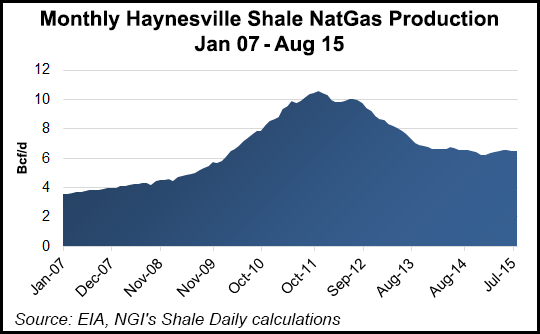E&P | Haynesville Shale | NGI All News Access | NGI The Weekly Gas Market Report
Haynesville Refrack Market to Exceed $500M by 2020, Research Firm Predicts
As the “lower for longer” commodity price environment drags on, producers will increasingly return to previously drilled horizontal wells, refracture them and bank the lower-cost returns, according to a new study of well refracturing in the Haynesville Shale.

Refracking costs vary depending on the type of job, lateral length, and method used, according to market research firm Energent Group. However, based on proppant, chemical, and stage information, the range of refrac costs is $900,000 to $2.8 million for several operators in the firm’s just-published Haynesville Refrac Study.
With gas prices near $2.75/Mcf, refrack jobs at $1.75 million are economically viable, Energent said. The firm’s study revealed the average refrack cost to be about $1.65 million per well.
Such returns are good enough to auger the application of refracking in other shale plays, Houston-based Energent said. In the Haynesville, the refrack market will exceed $500 million by 2020, according to the study. Energent plans to study the economics of refracking in other shale plays in the future.
“Operators must find ways to reduce the uncertainty of refrack programs and demonstrate returns compared to other investment options,” said Todd Bush, Energent principal and one of the report’s authors. “With the thousands of horizontal wells drilled across the shale plays, operators are now using lessons learned from recent completions to extract more value from existing assets.”
Energent examined wells of six Haynesville operators in its study (Vine Oil & Gas LP, Encana Corp., Exco Resources Inc., EP Energy, BHP Billiton, Sabine Oil & Gas).
“Based on the operator refrack activity to date, 70% of the wells completed in the last seven years are likely refrack candidates,” the report said. “This indicates 1,800 wells are possible refrack candidates.” The research excluded top-producing wells from the refrack candidate pool “…due to the risk involved in the refrack process.”
The research found that refracks yield close to 39% of initial production and offer compelling economics at $2.30-2.50/Mcf breakeven, according to the report. Operators are moving beyond experimentation to full programs.
Earlier this year, IHS Energy Senior Consultant James Coan said domestic domestic exploration and production companies are “reassessing whether drilling and fracking new wells are the right way to go and whether it may be more advantageous to engage in refracking” (see Shale Daily, May 22).
The Haynesville offers a “unique opportunity” to demonstrate capital efficiency while proving effectiveness of refrack programs, Energent said. “This, in turn, will make their Haynesville Shale assets more attractive acquisition candidates. A strong indicator of this is investment by several investment banks, which are actively funding refrack initiatives across the shale plays.”
The next refracking report from Energent will focus on the Bakken Shale and is expected to be published by early December. A report on the Eagle Ford is to follow during the first quarter.
© 2024 Natural Gas Intelligence. All rights reserved.
ISSN © 2577-9877 | ISSN © 1532-1266 | ISSN © 2158-8023 |
